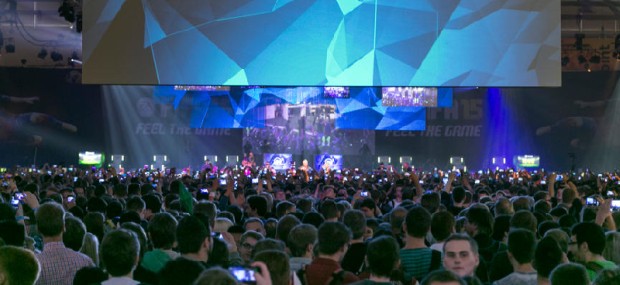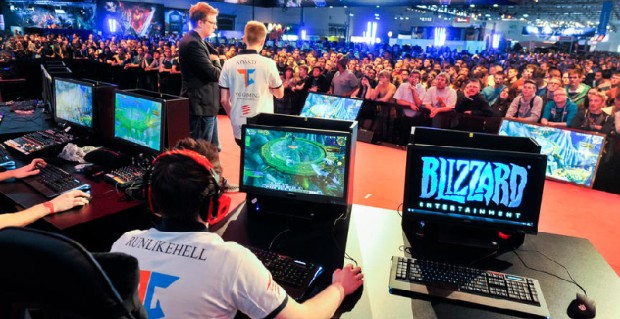What Are Game Industry Events Actually Like?
Good, Bad, Inside Or Out
Graham: When I was a teenager, I used to read internet coverage of E3 and dream of having the chance to go myself. I don't remember exactly what excited me at the time, but I'm sure it was the mixture of access to games I liked and the presumed sense of self-importance I'd attain by attending an exclusive event.
Now that I'm super important and have been to all the major gaming events numerous times (hi), I wonder whether there's a disconnect between reader perception of these events and what they actually are, mainly because I don't often enjoy them. So I asked Pip.
PIP. What game industry events have you liked or disliked?
Pip: You know that the answer is going to be eSports events, right? Unless your cunning use of the word "industry" means I can't use this as a soapbox…
Graham: Climb aboard.
Pip: I feel like that might be cheating though. I like them because they don't feel like industry events. I think with industry events I'm often assessing the merits of a game and working out whether I think people should pay for it or be interested in it. At eSports events that basic legitimacy isn't in question – it becomes about who manipulates the game best and about how fans channel their enthusiasm in creative ways. There are human stories to find and team narratives to watch unfold. It's not universally positive stuff and some events are far more interesting than others but you're not assessing the game in the same way.
Graham: The last major esports event I attended took place inside a cavernous warehouse, where after an initially impressive opening ceremony, the size of the room sucked out all the atmosphere. By the end of the first day most of the people had gone, leaving only uncomfortable chairs strewn about and knocked over.
I think this is my problem with major games events. Once they reach a certain scale, they seem like terrible settings for enjoying games, whether you're spectating competitive matches or assessing their quality. I find playing games an intimate experience, but that's diminished by the soulless, airless halls and booming music and litter-covered floors and jostling crowds.
Pip: I think it depends on how those events are structured and what you're expected to do. At gaming expos you're expected to be able to watch and chat with friends and play all in the same loud, dark airless environment while strangers try to do likewise with their friends or alone. If you're supposed to be working you're trying to talk to people while they try and monitor their game and answer questions from the general public. I remember when we were at Rezzed last year I had such a bad headache I sneaked out for a tactical visit to a dollshouse fair in a neighbouring hall just to refocus (and look at tiny, tiny battenbergs). I look at pictures of GamesCom and wonder if I would just have a full on panic attack lost in a crowd somewhere.
At dedicated tournaments there's less you're expected to do that distracts from the tournament. There might be stuff like meet and greets or cosplay but generally you're sticking to one thing and the event organisers are trying to facilitate that. For smaller events it can be chaotic though. People needing to share space for several games, distractions, jostling, food, noise. I guess there's a continuum. Some have tiny venues and get put together in a kind of ad hoc way, others get the stadium treatment.
Graham: It sounds like esports events are generally designed for humans in a way that other industry events are not. If nothing else, there's a presumption that if you're there, you're already interested. E3 and GamesCom have to vie for space and the attention of attendees alongside dozens of games doing similarly.
The stadium comparison seems fitting. Whether or not it's a bombastic action game in front of me, I find the experience of playing games is a quiet, focused one between me and the screen and systems and ideas in front of me. Doing that in a giant hall feels a little like going to Wembley to see an acoustic folk band. Something is lost.
The events I do like tend to be much smaller. Games in small rooms or more of a focus on talks and conversation. I think this is why GDC has become so popular outside of its initial remit as a conference for people who work in development. It's great for press because it's relaxed, and despite its growth, has stayed away from the stadium rock treatment. I think that serves the games better.
Pip: You're right about gaming expos feeling like they're vying for your attention. Often it feels like a total sensory overload – an escalating battle of bright signage, music, costumes…
What's GDC like, though? I've never been so I don't really have a sense for what it's like to be an attendee and whether I'd get 4 hours in and suddenly be struck by the urge to board a bus and head for the nearest area with grass and air and natural light.
Graham: There are a couple of halls where games want your attention, but there's no loud music, no huge signs, no flashing lights and dance performances. They tend to be small tables with posters and a laptop, or quiet, private booths with company logos outside.
Those two halls aren't the focus of the event though. That's either the talks where developers deliver wisdom intended to inspire, educate or impress their peers, or it's the meetings that go on external to the convention itself. I'll spend my time hopping between lecture halls where programmers talk about new hair simulation technology and hotel rooms and coffee shops where designers will talk openly and normally with less of the PR-controlled sell-sell-sell mindset you find elsewhere.
By the end of it I will be very tired and my feet will hurt, but I think it's good. And I don't typically enjoy leaving my house.
Pip: But that sounds really interesting! Wait. Was this whole post just an extended exercise in making sure you could really rub in the fact that I'm not going?
Graham: Pip, have I told you recently about my importance?
Readers! I'm curious what your perception of industry events are. In the next week, you'll see GDC mentioned in passing at a the start of a lot of interviews and features about games. What does GDC - or E3, or Gamescom, or any other event - look like from the outside? Do they seem fun as they did to me, or like the work events of any other industry, or like something else? Please share in the comments.
This article was first published as part of, and thanks to, The RPS Supporter Program.



